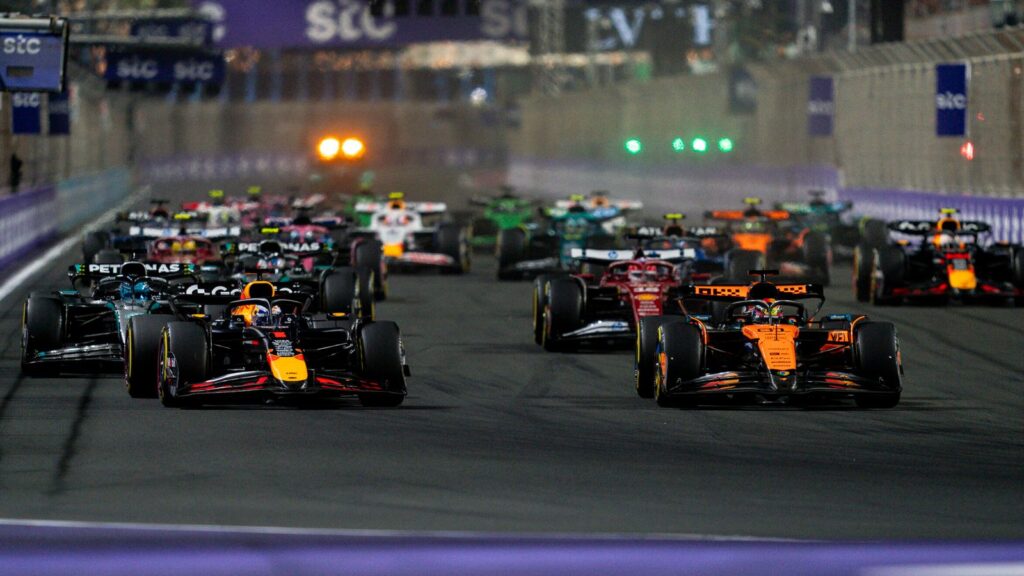F1 will hold further discussions over a late regulation change to the new 2026 power units which Mercedes boss Toto Wolff called “a joke”.
In the latest F1 Commission meeting on Thursday, a discussion was held involving next year’s engine manufacturers to decrease the amount of electrical energy for the 2026 technical regulations.
A vote was expected to take place but it did not happen. Four of the five engine manufacturers, which are Mercedes, Ferrari, Red Bull-Ford Powertrains, Audi and Honda, would have needed to vote in favour of the proposal for the regulations to be changed.
“The F1 Commission discussed in principle refinements to the energy management strategy for 2026, as well as measures to address financial issues that can be faced by Power Unit Manufacturers that experience either low performance or significant reliability issues in 2026,” said the FIA.
“All of these topics will be discussed in more detail among the specialists in the appropriate advisory committees.”
The new 2026 regulations will see a 50-50 split in the power unit output between the internal combustion engine and electricity.
The current power units for 2025 use around 20 per cent of electricity, so there would be a major increase for 2026.
However, the proposed change would have seen a drop in power from the electrical motor from 350kW to 200kW in race trim, which would result in a 60-40 split.
The reason behind this was due to fears that the drivers would run out of battery on power-sensitive circuits with long straights, forcing the drivers to “lift and coast” before the braking zone.
The F1 Commission in Geneva also revealed that plans to use alternative skid block material underneath the cars will be looked at to prevent the grass fires that were seen during the Japanese Grand Prix weekend, when sparks from the cars landed on the grass to cause the fire.
Wolff: Proposal is a joke | Other team bosses ‘open’ to idea
Mercedes are widely believed to be ahead when it comes to 2026, which is the biggest regulation change in F1 history with nearly every technical regulation being changed.
A meeting discussing 2026 and future power unit regulations had taken place earlier this month, where the teams agreed not to change any rules for next year.
Team bosses were asked about the proposal after the Saudi Arabian Grand Prix, ahead of Thursday’s vote and Wolff made his feelings clear.
“Reading the agenda of the F1 Commission is almost as hilarious as reading some of the comments that I see on Twitter on American politics,” he said.
“I really want to protect ourselves and make no comment, but it’s a joke. A week ago, there was an engine meeting and then things like this end up on the agenda again.”
Red Bull will enter a new era in a technical partnership with Ford as they build their own Red Bull Powertrains engine.
Christian Horner said the proposal was “pretty sensible” although it should have been looked at “two years ago”.
“Mercedes seem pretty confident with the job they have done for next year,” he said.
“This is something that we asked to be looked at two years ago, and it’s not something that we’ve pushed to be on the agenda this week at all.
“The FIA have gone away and done their research, and I think what they want to desperately avoid is a lot of lifting and coasting in the Grand Prix itself, which is going to be not particularly good for the sport and hugely frustrating for the drivers.
“It’s not something that we’ve lobbied for or asked for, and if they’re doing it in the interest of the sport, then you’ve got to support it.”
Ferrari boss Frederic Vasseur and McLaren team principal Andrea Stella were both “open” to the proposal.
“We have to be open with this and avoid to start to fight because we think that ‘we have an advantage on the battery’ or whatever. This could be the worst case scenario for F1,” said Vasseur.
“It’s true that we are at a corner with the regulation. If you look at the last 25 or 30 years, we never had such a big change in the regulation.
“It’s the first time that we are doing chassis, engine, sporting at the same time. It’s a challenge for the teams. It’s a challenge for the FIA.”
Stella added: “My opinion is very clear. The principle I want to state very strongly is that it is a responsibility of all the stakeholders to make sure that the 2026 regulations are successful because there’s no point in teams competing with each other if we don’t have a good sport.
“The quality of the sport, the quality of the spectacle, the quality of racing is a function of the product.
“From a chassis and power unit point of view, so I think keeping the conversation open, that we really go into the details, considering overtaking, considering power deployment, considering power harvesting, everything that determines the quality of the product, therefore of the spectacle and therefore the health of the business, we should look into that and we shouldn’t say it’s frozen.”
Formula 1 heads to Miami for a Sprint weekend on May 2-4, live on Sky Sports F1. Stream Sky Sports with NOW – No contract, cancel anytime








